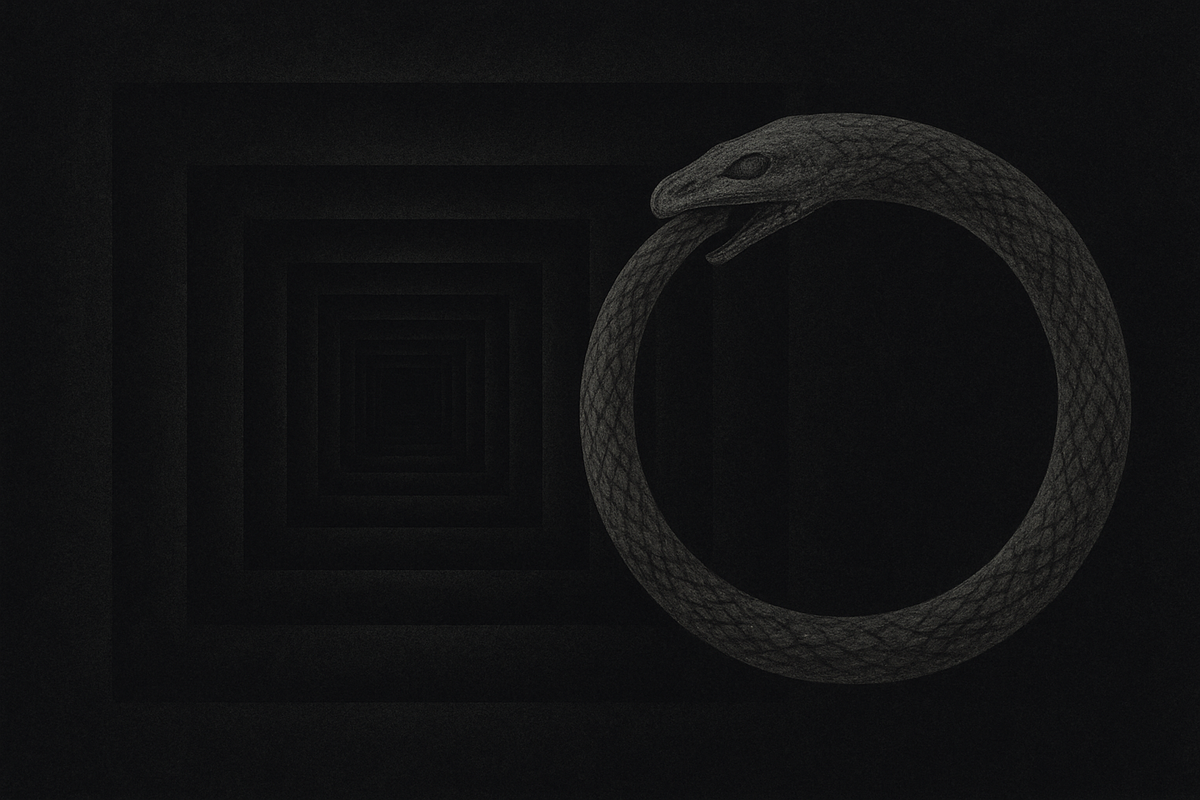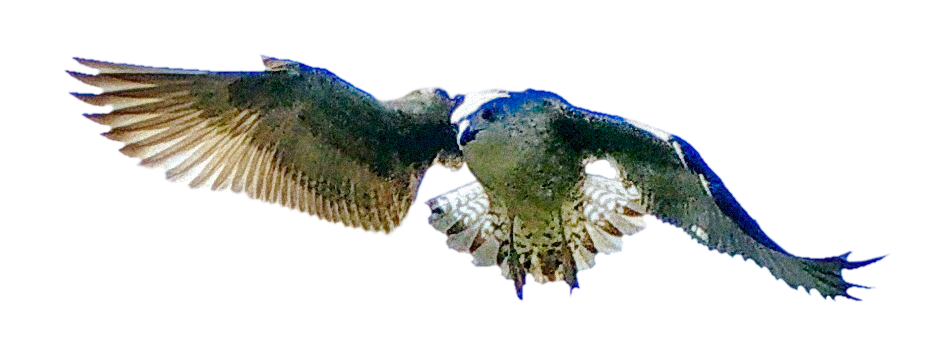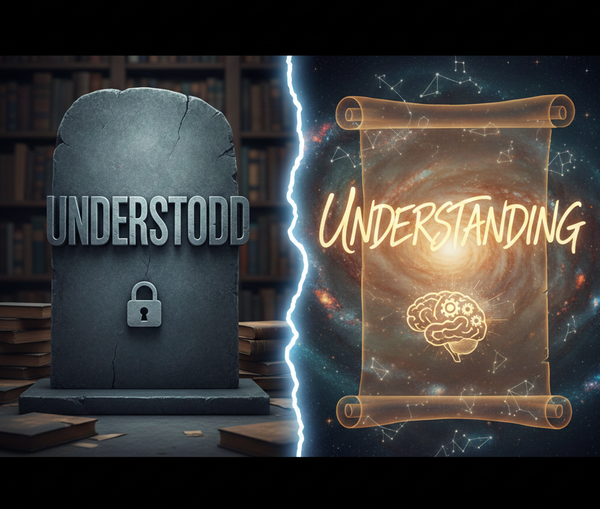Chasing Our Own Tail: Self-Reference and the Limits of any Academic Discipline

Marcus Doubtful, a physicist turned philosopher. Richard Trad, a mathematician turned philosopher.
Both have spent decades thinking about the foundations of knowledge, but they've reached very different conclusions.
Richard: Marcus, I've been reading your recent work on disciplinary self-reference. While I find your historical analysis interesting, I think you're making this far more complicated than it needs to be. These disciplines didn't emerge arbitrarily—they reflect the actual structure of reality. Physics studies the fundamental level, chemistry emerges from quantum mechanics, biology from chemistry, psychology from neuroscience. We're progressively understanding reality as it actually is.
Marcus: But Richard, that's exactly what I'm questioning. You say physics studies "the fundamental level"—but what makes something fundamental? Physics assumes space, time, causation, mathematical laws as its starting points. These aren't discoveries about reality; they're assumptions that Newton, Maxwell, Einstein made to get their theories off the ground.
Richard: Come now, Marcus. Space and time aren't arbitrary assumptions—they're the basic structure within which all phenomena occur. We measure them, we manipulate them with technology, we predict their behavior with extraordinary precision. How can you call that merely assumptive?
Marcus: Because physics cannot explain what makes something "physical" using physical methods. When physicists try to answer "What is physical reality?" they must use physical concepts—particles, fields, forces—that already presuppose they know what "physical" means. It's circular. The concept of physical reality is embedded in every physical measurement, yet cannot be established physically.
Richard: But that's like saying geometry is circular because it starts with points and lines. These are necessary starting points for any coherent investigation. The success of physics in prediction and technology shows we're tracking something real about the structure of the world.
Marcus: I'm not denying the success, Richard. I'm questioning what that success means. Your geometry example is perfect—Euclid chose to start with points and lines, but he could have made different choices. Non-Euclidean geometries show that. The question is whether physics reflects the structure of reality or whether it's a historically contingent way of organizing our knowledge that happens to work well for certain purposes.
Richard: But consider mathematics itself, Marcus. When Euclid developed geometry or when Cantor developed set theory, they weren't making arbitrary choices—they were discovering eternal truths about abstract structures. Mathematical objects exist independently of human communities. Two plus two equals four whether humans exist or not.
Marcus: That's where we fundamentally disagree. When mathematicians like Euclid, Newton, Cantor, Hilbert developed mathematical systems, they made choices about what abstract objects or concepts to treat as foundational—numbers, sets, functions. But mathematics cannot prove that mathematical reasoning is consistent. Gödel showed this definitively. Mathematics cannot establish its own consistency without circular reasoning.
Richard: Gödel showed formal limitations, yes, but that doesn't undermine the objectivity of mathematical truth. We can still know that basic arithmetic is consistent even if we can't prove it within arithmetic itself. We can step outside the formal system.
Marcus: But when you "step outside," what are you stepping into? Another formal system with its own assumptions, that's infinite regress. The concept of mathematical truth is embedded in every mathematical operation, yet cannot be established mathematically. You're constantly shifting the foundational assumptions rather than eliminating them.
Richard: Let me try a different approach. Consider logic itself. Logical principles like non-contradiction aren't arbitrary cultural constructs—they're necessary for any coherent thought whatsoever. Even your critique of these disciplines relies on logical reasoning.
Marcus: Exactly! And that's the trap. When Aristotle, Boole, Frege, Russell developed logical systems, they chose to start with propositions, truth values, inference rules. But logic cannot establish that logical reasoning is valid without using logical reasoning. The concept of logical validity is embedded in every logical operation, yet cannot be established logically without circularity.
Richard: But surely you see the self-refuting nature of your position? If all reasoning is circular, then your argument against the objectivity of these disciplines is itself circular and unreliable.
Marcus: I'm not saying reasoning is unreliable, Richard. I'm saying it's not self-grounding. We can reason successfully within inherited traditions without those traditions being able to justify themselves. The circularity doesn't make the disciplines useless—it makes them partial and provisional.
Richard: Well, let's consider biology then. Surely you can't deny that when Darwin and Mendel discovered evolution and genetics, they were uncovering objective facts about living systems? DNA actually exists, genes actually cause traits, species actually evolved. These aren't cultural constructs.
Marcus: But what makes something "living," Richard? When Darwin, Mendel, Watson, and Crick developed biological theories, they started with organisms, genes, cells, proteins. These concepts all presuppose "life" as an organizing principle. But biology cannot explain what life is without circular reasoning. You cannot explain life biologically because the concept of life is embedded in every biological concept.
Richard: That's just definitional precision. We can define life operationally—metabolism, reproduction, homeostasis, evolution. These are measurable phenomena.
Marcus: But each of those criteria presupposes you already know the difference between living and non-living systems. Why should metabolism in a cell count as "life" while chemical reactions in a flame count as mere chemistry? The boundary is assumed, not discovered. And that assumption shapes everything biology can see.
Richard: Marcus, you're dissolving all meaningful distinctions. There are real differences between living and non-living systems, conscious and unconscious entities. Psychology studies genuine mental phenomena—memory, perception, decision-making. These aren't just cultural categories.
Marcus: I agree there are differences, but I question whether the psychological categories capture them accurately. When William James, Freud, Skinner, and cognitive scientists developed psychological theories, they chose to start with concepts like mind, behavior, cognition, consciousness. But psychology cannot explain the psychological basis of psychological research itself without circularity.
Richard: But neuroscience is showing us that mental phenomena are brain phenomena. Psychology will eventually be reduced to neuroscience, neuroscience to biology, biology to chemistry, chemistry to physics. We're seeing the unification of knowledge around physical principles.
Marcus: That's a beautiful assumption of reduction, Richard, but consider what happens at each step. Neuroscience assumes neural activity, brain states, information processing—concepts that already presuppose the mind-brain relationship you're trying to explain. Computer science, which provides many of neuroscience's metaphors, cannot determine whether intelligence is actually computational using computational methods. Each level introduces its own circular dependencies.
Richard: Marcus, I think you're confusing levels of analysis. Just because physics can't explain consciousness doesn't mean consciousness isn't physical. Just because biology can't define life doesn't mean life isn't biological. These are pragmatic divisions of labor, not fundamental limitations.
Marcus: But that's exactly my point! These are pragmatic divisions—historically contingent ways of organizing inquiry that specific communities developed. They're not discoveries about the natural joints of reality. Different communities making different choices at crucial historical moments could have led to entirely different ways of organizing knowledge.
Richard: So you're saying all knowledge is relative to cultural communities? That seems to lead directly to relativism.
Marcus: Not relativism—recognition of partiality. Each disciplinary tradition offers genuine insights within its domain while remaining unable to examine its own foundations. The problem arises when we forget this partiality and treat our tools as transparent descriptions of reality and truth itself.
Richard: But consider philosophy itself, Marcus. When we engage in rational discourse, when we make distinctions and arguments, we're trying to get at truth, aren't we? Philosophy has to assume some universal standards of reasoning or it collapses into mere opinion.
Marcus: And there's the deepest circularity of all, Richard. When Plato, Aristotle, Descartes, Kant developed philosophical systems, they chose to start with concepts like rationality, truth, knowledge, existence. But philosophy cannot establish the validity of rational discourse using rational discourse without assuming what it's trying to prove. The concept of rationality is embedded in every philosophical analysis, yet cannot be established rationally without circularity.
Richard: So what are you proposing, Marcus? That we abandon systematic inquiry altogether? That we give up on the pursuit of knowledge?
Marcus: Not at all. I'm proposing we hold our systematic inquiries more lightly. We can use mathematical tools without believing mathematics describes the eternal structure of reality. We can employ computational models without assuming intelligence is computation. We can investigate biological phenomena without claiming to have captured the essence of life.
Richard: But that seems to undermine the entire scientific project. If our methods don't track truth, why should we trust them?
Marcus: Because they're useful within their domains, Richard. Domains we have explicitly created. A hammer is useful for carpentry without the hammer needing to understand carpentry. Our disciplinary tools can be extraordinarily effective while remaining partial and provisional. The danger comes when we mistake the tools for reality itself.
Richard: I have to admit, Marcus, your analysis raises troubling questions. But I still believe these disciplines converge because they're tracking objective features of reality. The fact that physics, chemistry, and biology can be integrated suggests they're describing the same underlying reality from different perspectives.
Marcus: Or it suggests that later disciplines inherited metaphysical assumptions from earlier ones. When biology adopted physicochemical reductionism, it wasn't discovering that life is "really" physics—it was choosing to use physical concepts to organize biological phenomena. The convergence reflects shared assumptions rather than objective unity.
Richard: That would mean the entire modern scientific worldview is built on ungrounded historical choices rather than progressive discovery of truth.
Marcus: Partially, yes. But that doesn't invalidate the worldview—it contextualizes it. These are powerful tools developed by specific communities for engaging with aspects of human knowledge derived from experience. They've been remarkably successful within their domains. The problem arises when we forget they're tools with limitations.
Richard: This conversation has been... unsettling, Marcus. But I'm not ready to give up on the idea that our disciplines, however historically conditioned, are progressively revealing the objective structure of reality or truth.
Marcus: And I'm not asking you to give it up, Richard. I'm asking you to hold it as a working hypothesis rather than as an established fact.
Richard: Perhaps. Though I have to say, if your analysis is correct, it raises profound questions about the nature of human knowledge itself.
Marcus: Yes, it does. Consider what we've discussed so far: we've been remarkably successful at establishing academic disciplines. We base them on foundational assumptions—objects and concepts—and accepted reasoning methods and truth criteria. Within the boundaries of each discipline we use our understanding to create explanations and develop new concepts.
Richard: Go on.
Marcus: But now we could ask a different type of question. How do we establish an academic discipline? What are objects and concepts? What are reasoning methods? What is understanding itself? What is reason? What is an explanation? What is truth? What is reality? When we establish a discipline and then reason within its boundaries, who or what is doing the work of creating new objects and concepts? Who or what is using reason? Who or what is verifying truth? Traditionally we take these for granted and simply use them.
Richard: I see where you're heading. And I suspect I know what the problem is going to be.
Marcus: Exactly. We cannot create a new discipline within which to reason about these questions because we would encounter the ultimate circularity. We cannot use concepts and reason to explain the creation of concepts and reason without infinite regress. Any attempt to study the foundations of conceptual thought must use conceptual thought itself.
Richard: So we're trapped? There's no way to examine the ultimate foundations of knowledge?
Marcus: Not trapped—but we need a different approach entirely. That's where Geneosophy comes in.
Richard: Geneosophy? I'm not familiar with that term.
Marcus: From the Greek genea meaning generation or birth, and sophia meaning wisdom. Geneosophy is the investigation of how knowledge, concepts, and understanding themselves come into being—but it cannot be a traditional academic discipline because it cannot use the tools of disciplinary thinking. It cannot be based on assuming concept and objects, the very thing it is trying to explain.
Richard: But then how can it proceed at all? If it can't use concepts and reasoning, what methods are left?
Marcus: Geneosophy involves a kind of direct attention to the very activity of conceptualization as it happens. Rather than analyzing concepts and objects as we do traditionally within a discipline, we attend to the process by which concepts and objects form. Rather than reasoning about reason, we become aware of reasoning as it unfolds. It's a shift from studying objects and concepts to recognizing the activity that gives rise to objects and concepts.
Richard: That sounds dangerously close to mysticism, Marcus. How can we distinguish genuine insight from self-deception without rational criteria?
Marcus: That's the wrong question, Richard. It assumes we need to judge Genosophic insight by disciplinary standards. But Geneosophy isn't a traditional discipline within which to evaluate concepts—it's trying to recognize the source from which disciplines can be established. It's prior to the subject-object distinction that makes evaluation possible within a discipline.
Richard: But surely there must be some way to distinguish... Actually, I think I see the problem. Any criteria I propose would already assume I am within a discipline.
Marcus: Precisely. Geneosophy isn't about creating one more discipline—it's about recognizing the new conceptual space within which all knowledge appears. It's like asking not what you see, but recognizing the awareness in which seeing occurs. And it will take time and effort on your side to develop the new types of concepts that will allow you to comprehend and formally express within the new conceptual space.
Richard: This is profoundly disturbing, Marcus. You're suggesting that all our sophisticated methods of inquiry are floating in something we cannot examine using those very methods.
Marcus: Not floating in something else, Richard. They're expressions of an activity that cannot be turned into an object of study because it's the subject of all study. Every time we try to examine it, we're already engaged in it.
Richard: And you think this... Geneosophy... can somehow resolve the circularity problem?
Marcus: Not resolve it—transcend the need to resolve it. The circularity only appears problematic from within the disciplinary assumption that everything must be explainable in terms of something else. Geneosophy recognizes that the ultimate foundation of knowledge is the very possibility for knowledge itself—which doesn't need to be grounded in traditional concepts and objects.
Richard: I find myself both intellectually intrigued and deeply resistant. Part of me wants to dismiss this as philosophical word-play, but another part recognizes that you may have identified something genuinely fundamental that our traditional methods can't capture.
Marcus: That resistance is natural, Richard. Our entire intellectual culture is built around the assumption that valid knowledge must be disciplinary knowledge—testable, analyzable, reducible to objects and concepts which are the axioms or assumptions of the discipline.
Richard: Marcus, if you're right—and I'm not saying you are—but if you're right, this changes everything. It means that all our academic disciplines, however successful, are essentially... what? Sophisticated games played within boundaries we cannot examine using the rules of the game?
Marcus: Not games, Richard. Genuine expressions of human intelligence and creativity. But yes, they're partial expressions that mistake themselves for complete descriptions of truth and reality. The tragedy isn't that we have these disciplines—it's that we've forgotten they're human constructions and begun treating them as fundamental tools.
Richard: And Geneosophy would help us remember?
Marcus: Geneosophy would help us recognize the autonomous creative happening that gives rise to all disciplines—including the capacity to transcend the limitations of any particular disciplinary perspective. It's not about abandoning systematic inquiry, but about holding it within a larger recognition of what we are in our fullest realization. Not just the one we are conscious about, that take concepts, objects and reasoning as assumptions and starting points.
Richard: What we are... Now you're venturing into anthropology, psychology, perhaps even theology.
Marcus: No, Richard. Those are more disciplines, with their own foundational assumptions about human nature, mind, and ultimate reality. Geneosophy doesn't study what we consciously feel we are—it recognizes the conditions of possibility within which all disciplines are established.
Richard: I have to admit, Marcus, this conversation has been unlike any philosophical discussion I've had in forty years of academic life. You've simultaneously undermined everything I thought I knew about the foundations of knowledge and opened up something that feels... larger.
Marcus: That's the beginning of Genosophic recognition, Richard. Not the acquisition of new knowledge, but the discovery that what we most fundamentally are is the very capacity for knowledge itself—prior to any particular knowledge.
Richard: I find myself in an unusual position. I cannot refute your arguments using the rational methods, because those very methods are what you've called into question. Yet I cannot simply dismiss what you're saying, because it addresses something I've always sensed but never been able to articulate—the mysterious fact that there is knowing at all.
Marcus: Then perhaps this conversation has served its purpose, Richard. Not to convince you of anything, but to point toward the inexhaustible mystery of consciousness itself—the one reality that all our disciplines presuppose but none can explain.
Richard: And that's what you call Geneosophy? The recognition of consciousness as the irreducible foundation of all knowledge?
Marcus: Among other things, yes. But even calling it consciousness or foundation is to turn it back into a concept. Geneosophy is more like... a different conceptual space within which it becomes possible to study the conditions for reasoning and knowledge to occur.
Richard: Marcus, you've managed to do something I would have thought impossible an hour ago. You've instilled doubts in a mathematician that the most important insights might be precisely those that cannot be proven.
Marcus: And you've shown me, Richard, that even the most committed rationalist and materialist carries within themselves an appreciation for the mystery that makes rationality and materiality possible.




